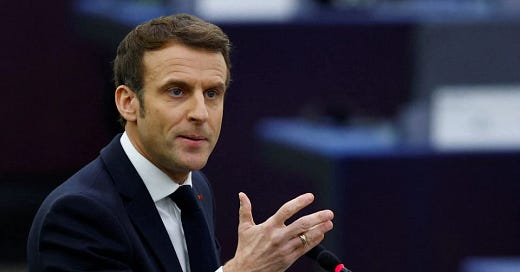European Political Community: inauguration at the EU leader summit in Prague
The important event of this week is probably Thursday's first meeting of Macron's European Political Community. What can you expect from Thursday meeting?
Thank you for your continued readership. To support The Beubble, consider liking this post.
European Heads of State and governments will meet this week, from Thursday to Friday, in Prague, for an informal meeting. Don’t be fooled by the term “informal”, the meeting will not involve Sanna Marin-style dancing and Czech spirits drinking: European leaders will discuss important issues, the specter of the war in Ukraine looming over the talks.

The first meeting of the European Political Community
From an original idea from President Emmanuel Macron, the European Political Community (EPoC) will aim at encouraging dialogue and cooperation between the EU and non-EU countries on matters of common interest.
It will be formally launched on Thursday 6 October in Prague.
A booster for EU’s diplomacy
The summit will be the occasion to see if the EPoC has the potential to become a valuable tool to boost the EU's diplomacy and influence towards its closest neighborhood.
In the context of the war in Ukraine and the subsequent Zeitenwende speech by Olaf Scholtz in February, the EPoC will discuss ways to reinforce the Western’s support to Ukraine, as the war rages on and the easternmost regions have been annexed by Russia. NATO Secretary-General Jens Stoltenberg should also take part in the discussions.

Guests of honor
The United Kingdom and Turkey are two decisive guests of the EPoC talks this week. The first will seek to define its position towards the EU that is not fully competitive and attempt to grow severed ties back. Prime minister Liz Truss's decision to attend is an important event, as she previously indicated that the UK would not seek privileged relationships with the EU after its recent breakup. This turnaround is the first success of the EPoC - while we can’t say the same about Liz Truss.
Turkey also sees the meeting as a tentative to improve its relationships with the EU, damages after years of difficulties over migrations, gas, the Middle East, and attempts at democracy. Although I don’t see how could Turkey push its EU candidacy forward anytime soon, we could experience here warming of the relationship between Ankara and Brussels.
Reasons for hope
Finally, I hope the EPoC could give proof of Europe’s care and interest for the Western Balkans countries, especially to Kosovo and Serbia, in which border tensions arose in the Summer over license plates. The question of Bosnia will probably not be raised this week, but I hope the EPoC, as a geopolitical forum, could bring solutions rather quickly.
The main question remains the level of ambition that the organizers want to give to the conference. Many - myself included - believe that the EPoC should be more of a laboratory for collaboration and European integration than a leader’s forum.

But the EPoC, as Corina Stratulat, Senior Policy Analyst and Head of the European Politics and Institutions programme at the European Policy Centre raised, should not be “an excuse not to deal with internal EU reform or deliver on enlargement.”
Mustering the courage to embark on a European Convention that might lead to Treaty change would not only help the cause of the EU-hopeful countries – especially if it deals with the Union’s absorption capacity, unanimity principle and lack of democratic acquis – it would also strengthen the credibility of the EU’s efforts to encourage political coordination beyond its borders. - Corina Stratulat, European Policy Centre
Thank you for your renewed support and sponsorship. Subscribe, share, like and comment on this post.




